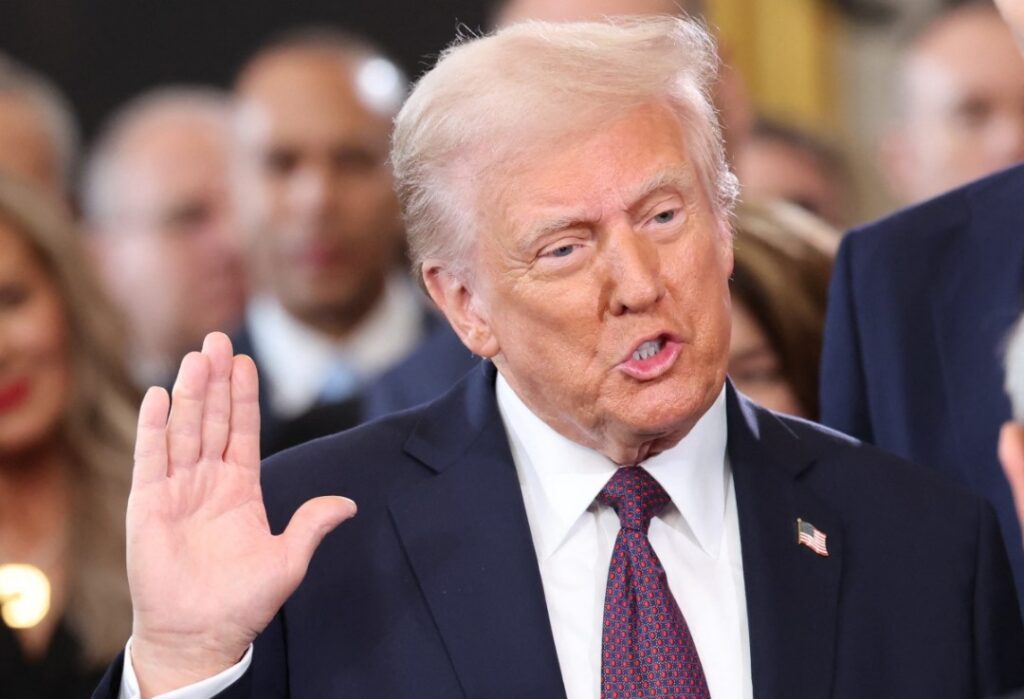
Amid escalating tensions and rising civilian casualties, former U.S. President Donald Trump has issued a stern warning to Iran, while expressing strong support for Israel’s ongoing military campaign against Iranian targets. The latest wave of violence between the two nations has left dozens dead, disrupted daily life across both countries, and raised fears of a much broader regional war.
In a strongly worded post on his Truth Social platform, Trump declared that any attack by Iran on American personnel or interests would be met with unprecedented force. “If we are attacked in any way, shape or form by Iran, the full strength and might of the U.S. Armed Forces will come down on you at levels never seen before,” he said. Trump also expressed optimism that a peace deal could be reached soon, despite the intensifying conflict. “We will have PEACE, soon, between Israel and Iran! Many calls and meetings now taking place,” he wrote, hinting that Russian President Vladimir Putin might play a role in mediating a resolution.
Trump’s comments came amid a flurry of diplomatic activity behind the scenes and increasing military confrontations on the ground and in the skies. In an interview with ABC News, Trump suggested that the current conflict might serve as a catalyst for renewed negotiations. “They want to talk, and they will be talking,” he said. “Something like this had to happen. It may have forced a deal to go quicker, actually.” However, Trump offered no specifics or evidence of progress toward peace.
Despite Trump’s assurances, the situation on the ground remains dire. Israeli forces launched a surprise military operation—dubbed “Operation Rising Lion”—on Friday, targeting high-level Iranian military personnel and nuclear facilities. According to Israeli officials, the operation was intended to neutralize what they described as an “existential threat” posed by Iran’s nuclear and ballistic missile programs. Israeli Prime Minister Benjamin Netanyahu, speaking to Fox News, confirmed the campaign would intensify and hinted that regime change in Iran could be an unintended but welcome outcome. “We’re geared to do whatever is necessary to achieve our dual aim—to remove the nuclear threat and the ballistic missile threat,” he said. “Could regime change be the result? Certainly, because the Iranian regime is very weak.”
In response, Iran launched multiple waves of missiles at Israeli cities, marking some of the deadliest direct attacks in recent memory. Missiles struck residential areas in Tel Aviv, Haifa, and the southern town of Bat Yam. At least 13 Israelis have been killed over the past two days, including children, with dozens more injured. Rescue teams, using sniffer dogs and heavy machinery, have been working around the clock to search for survivors trapped under collapsed buildings.
Iran has also suffered devastating losses. The Iranian government reported that 78 people were killed on Friday alone, with scores more casualties reported over the weekend. In one particularly deadly strike, an Israeli missile flattened a 14-story apartment building in Tehran, killing 60 people, half of them children. The Israeli military also targeted critical infrastructure, including oil and gas facilities, sparking massive fires that lit up the night sky and disrupted fuel distribution across the country. Iranian authorities have not yet released a full casualty count from the weekend’s attacks, but early estimates suggest the death toll is well over 130.
As both countries exchange fire, civilians are bearing the brunt of the conflict. In Israel, air raid sirens have become a constant presence, with families sheltering in basements and safe rooms as missiles fall. In Iran, residents near military installations have been told to evacuate amid fears of further Israeli strikes. Iranian state television broadcast a warning from the armed forces, urging people to avoid “vital areas” that could be targeted.
Amid the chaos, questions have emerged about the role of the United States in Israel’s military campaign. Two senior U.S. officials told Reuters that Trump recently vetoed an Israeli plan to assassinate Iran’s Supreme Leader Ayatollah Ali Khamenei. According to one of the officials, Trump said such a drastic escalation would only be considered if Americans were killed. “Have the Iranians killed an American yet? No. Until they do, we’re not even talking about going after the political leadership,” the official said.
Israeli Prime Minister Netanyahu declined to confirm the report but acknowledged that he had briefed Trump ahead of Israel’s military action on Friday. “There’s so many false reports of conversations that never happened, and I’m not going to get into that,” he told Fox News. “We do what we need to do.”
Trump, meanwhile, has denied Iranian allegations that the United States is directly involved in Israel’s military strikes. However, two U.S. defense officials confirmed that American forces have helped intercept Iranian missiles aimed at Israel, highlighting the complex and dangerous nature of the current military and diplomatic landscape. Trump has also previously said that nuclear negotiations with Iran were progressing well, but the latest round of talks scheduled for Sunday in Oman was canceled following the intensification of hostilities.
The conflict has severely disrupted travel and commerce in the region. El Al Airlines, Israel’s national carrier, has suspended all flights until at least June 19, citing ongoing security concerns. Additional cancellations have been extended to June 23 for several European routes. The Israeli airspace remains closed, and the National Security Council has issued warnings against travel through neighboring countries like Egypt and Jordan, both of which remain under Level 4 travel alerts due to the high threat level.
In Bat Yam, one of the Israeli towns hardest hit by the Iranian missile strikes, stunned residents gathered on Sunday evening to assess the damage. “It’s very dreadful. It’s not fun. People are losing their lives and their homes,” said Shem, 29, whose home was shaken by the impact of a nearby explosion. Across Israel, many spent another sleepless night amid fears of additional strikes.
As missiles continued to fall and international concerns mounted, German Chancellor Friedrich Merz expressed hope that the G7 leaders meeting in Canada could work toward a unified response to the crisis. “This conflict must not be allowed to spiral into a wider regional war,” Merz said.
Despite the widespread devastation, Trump continues to insist that peace between Iran and Israel is still within reach. His unshakeable optimism stands in stark contrast to the grim reality on the ground. With both nations showing no signs of backing down and the civilian death toll rising by the hour, hopes for a peaceful resolution remain distant—even as secret diplomatic channels continue to buzz in the background.
The world watches with bated breath as the Israel-Iran conflict deepens, drawing in global powers and putting the entire Middle East on edge. Whether the crisis ends in diplomacy or disaster may depend on decisions made in the coming days.




















Comments